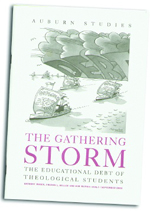 |
| Single copies of The Gathering Storm are available free from Auburn Seminary at (212)662-4315. Multiple copies are $5.00 each, and larger orders are available at a discount. The full text of the report is available at http://auburnseminary.org/the-gathering-storm/. |
The latest publication from Auburn Theological Seminary's Center for the Study of Theological Education is The Gathering Storm:The Educational Debt of Theological Students. The study includes data from recent surveys of U.S. students and graduates of theological seminaries; it compares that data with the results of Auburn's 1991 study, Manna From Heaven: Theological and Rabbinical Student Debt. The new study's authors -- Anthony Ruger, Sharon L. Miller and Kim Maphis Early -- discovered that more students are borrowing, that they are borrowing more, and that some are getting into trouble.
Highlights from the study follow. Note that "debt" refers only to educational debts incurred while in theological school. Undergraduate debt is not included.
How much debt?
- In 1991, more than half of master's of divinity students had not borrowed for their seminary education, but in 2001, only 37 percent of graduates had no debt. In 1991, only seven percent of M. Div. graduates borrowed $20,000 or more, but in 2001, 33 percent of graduates had borrowed that much.
- In 1991, only one percent of M. Div. graduates had borrowed $30,000 or more, but in 2001, 21 percent of graduates had borrowed that much.
- Six percent of M. Div. graduates had more than $50,000 in educational debt from seminary alone.
- The average (mean) amount borrowed by M. Div. students for their theological education doubled in ten years.
Why so much borrowing?
- The increase in borrowing can be attributed, at least in part, to the increase in the availability of federal funds and low interest rates over the last several years.
- The changing demographics of seminary students -- many of whom are married with children and most of whom are beyond the age when they would consider living in a dormitory -- has meant a sharp increase in the cost of living for students.
- Lifestyle choices and personal management skills also play a role.
- A quarter of those who borrowed disagreed with the statement "Educational loans played an essential role in allowing me to attend theological school."
- Auburn's first study of theological student debt found that the amount of educational debt a student was likely to incur depended to a large degree on which school the student attended. Almost 70 percent of borrowers felt that educational loans allowed them to attend the school of their choice.